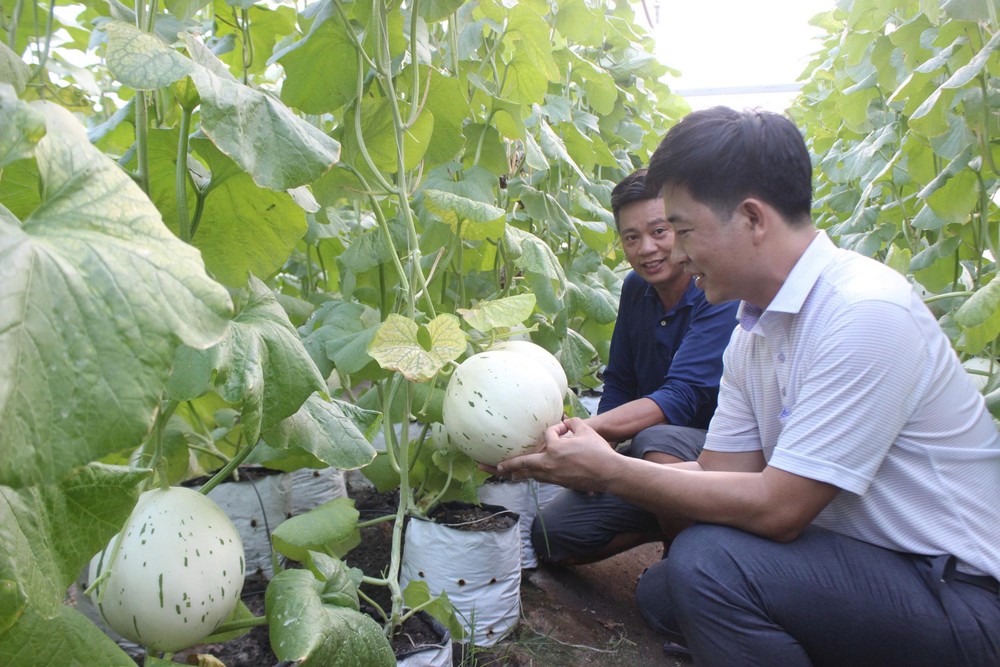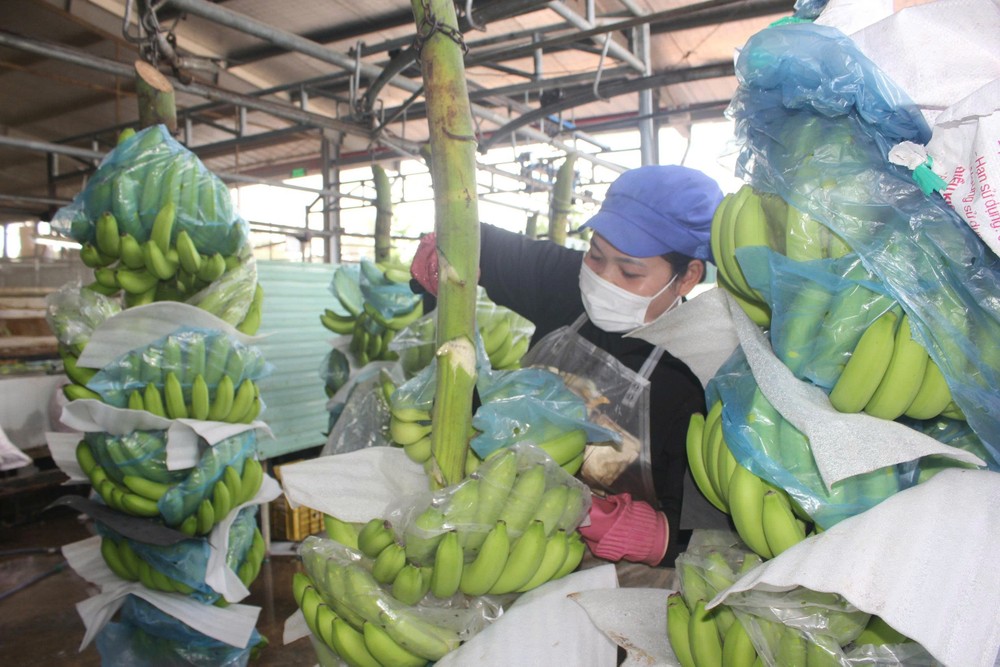
Farmers start livestreaming to sell products
Binh Loi Apricot Village has long been renowned across Ho Chi Minh City and the Southern region. In October 2024, the Chairman of the Ho Chi Minh City People’s Committee officially recognized it as a traditional craft village specializing in yellow apricot cultivation. Today, the area boasts over 600 hectares of apricot gardens, primarily growing the mai giao apricot which is created from the cross between the Yulan magnolia (Magnolia denudata) and the lily magnolia (Magnolia liliiflora) variety. Mai giao apricot is highly prized by traders and gardeners alike. Most local growers still follow traditional methods of cultivation and sales.
Among them, Director Bui Ngoc Duc of Mai Vang Tet Company in Binh Loi Commune stands out as a dynamic young entrepreneur managing one of the area’s largest apricot gardens. After participating in livestream sales training sessions organized by the local Farmers’ Association, Director Bui Ngoc Duc quickly mastered this modern sales channel. As a result, his company’s yellow apricot products now reach markets in Central and Northern Vietnam - well beyond Ho Chi Minh City, where they were previously sold exclusively.
Thanks to digital transformation and livestream marketing, Mai Vang Tet Company now generates annual revenues in the tens of billions of Vietnamese dong. Director Bui Ngoc Duc shared that many farmers in Binh Loi have followed suit, learning to use social media platforms to expand their reach. Once limited to traditional Tet-season markets, local growers now trade yellow apricots year-round through online channels. This shift has transformed Binh Loi’s apricot market from a regional specialty into a nationally recognized brand.
Meanwhile, U&I Agriculture Joint Stock Company (Unifarm Company) in Ho Chi Minh City’s Phuoc Thanh Commune has built management software designed by its own internal team. The process from breeding, planting, harvesting, preserving, processing and bringing products to market is strictly controlled through this system. Each batch of goods can be traced back to each worker, each day of care.
Thanks to that, Unifarm's products meet the strict requirements of international partners such as Dole Group, bringing Vietnamese bananas into the global distribution system. In the melon model, Unifarm hired Israeli experts to train greenhouse growing methods. They then transferred the VietGAP standard process to cooperatives and associated farmers.

According to Chairman Pham Quoc Liem of Unifarm, from the initial 1 hectare, the company has now formed a 15-hectare on-site material area and 10 hectares of off-site cooperation. All stages are managed through software, product coding, helping Unifarm brand melons conquer the Singapore and Malaysia markets. In Phu Giao Commune of Ho Chi Minh City, since 2021, Kim Long Cooperative has deployed an electronic diary in the entire melon cultivation process. This method helps to record details about varieties, fertilizers, planting dates, harvest dates and growth indicators. Thanks to that, each product has its own QR code to trace its origin.
Director of Kim Long Cooperative Nguyen Hong Quyet said that information transparency is a decisive factor in convincing supermarkets and export markets. At Kim Long Cooperative, melons are grown in greenhouses using Israeli technology, drip irrigation and automatic fertilization. This reduces labor, limits the impact of weather, controls pests and diseases, and creates safe and uniform products.
This year, the cooperative's melon output increased from 1.5-2 tons/crop to 3-4 tons/crop, with an average profit of more than VND250 million per ha. Not only focusing on production, Kim Long Cooperative also invests in livestream sales on Facebook and TikTok.
Currently, each week, the Cooperative has several livestream sessions, introducing pre-harvesting and packaging. This method helps increase online orders by 10 percent to 15 percent per week. “Cantaloupe buyers can see with their own eyes and feel through the images and words of Kim Long Cooperative staff. Trust comes from authenticity,” said Director Nguyen Hong Quyet.
Digital transformation associated with production linkage
Experts agree that Ho Chi Minh City's expansive metropolitan area is well-suited for multi-sector agricultural development. Tran Minh Hai, Vice Principal of the School of Public Policy and Rural Development recommends that in addition to investing in traditional rural infrastructure, the city should prioritize non-infrastructure investments. These include strengthening cooperatives in terms of organization, service provision, and supply chain linkages.
According to Vice Principal Tran Minh Hai, cooperatives must evolve into effective centers for coordinating production and consumption. They should have the capacity to offer services to businesses, provide technical support, manage quality through technology, and organize joint purchasing and selling to minimize costs and maximize product value.
Digital transformation will be most effective when integrated into a production and consumption linkage model. If individual households operate in isolation, the impact of digital applications will be limited. By connecting in a chain, technology can help the entire farming community develop synchronously from production and processing to marketing and sales, providing a solid foundation for the country's agricultural sector to integrate into the Technology 4.0 era.
Deputy Director of the Ho Chi Minh City Department of Agriculture and Environment, Ho Truc Thanh notes that on the path to agricultural modernization, many of the city's cooperatives and enterprises have adopted digital agriculture as a core strategy to enhance production and business efficiency. Digital agriculture is fundamental to improving productivity, increasing process transparency, and boosting the value of agricultural products. When data becomes an asset and livestreaming functions become a key sales channel, farmers are effectively entering a new competitive environment.
Looking ahead, the city's agricultural sector is committed to continued modernization, focusing on large-scale specialized cultivation and food safety. The extensive application of science, technology, and automation will underpin this development.
























